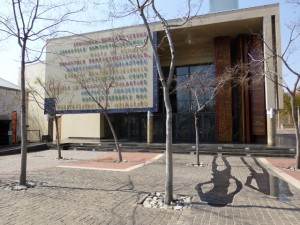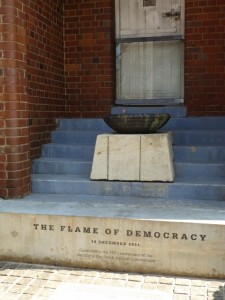For our last day in Jo’burg we took a tour of Constitution Hill, a historical landmark remembering the horrific injustices that took place at the Old Fort Prison Complex. Today, it is home to the Constitutional Court and stands as a symbol of South Africa’s freedom. We then visited representatives from the Treatment Action Campaign (an HIV/AIDS foundation) and finally went to a semi-private school in Soweto, which was by far my favorite part of the day.
First, we were taken around to each classroom in small groups and were allowed in exchange our questions and thoughts with the students. They asked a lot of questions to me individually, which made me a little giddy, but even more exciting was that they had an interest in mathematics! They wanted to know what I studied and why I chose that concentration. A young girl even asked my advice when doing math problems. She has hopes of attending an ivy league school in the United States one day and was really an inspiration. Not only did she take top classes at school, but studied additional chemistry and mathematics at home and took weekend classes.
Being at the school we got a small insight into the perspective of the United States. This is something I particularly love about children or teenagers—they have no reservations about being honest with you. When asked what they thought when they hearing the U.S., the response unanimously was “money” and even “money and booze” once. Many students thought we saw Nicki Minaj from day-to-day and I was asked if I had met Kate Gosselin from the reality show John and Kate plus 8 (because she’s from Pennsylvania). They also shared many U.S. tourist stereotypes, but I assured them that I did not think they were jungle people.
This concluded our stay in Johannesburg and I had so many thoughts whirling around in my head. That week was jam packed and I’d learned so much. It challenged me to think about the many similarities in the United States that I previously hadn’t given much attention, sadly. I’m a little embarrassed to say this, but specifically I’m thinking about Native Americans. After these experiences, I began to think about it more and more deeply. Before, it was merely just a passing sympathetic thought about the past and in reality there are still many prevalent issues, but I have had the privilege to ignore these. I am looking at reservations and what we did to the first people of our land with new acknowledgement and wish I would have been better educated in the past by my history teachers and by my own pursuits.
This has also made me think about what we learn in the United States, both formally in education systems and informally. The apartheid is openly talked about here. It is in their museums, addressed in politics, and most importantly the people that I have come in contact with are aware, not just of its happening but of what it caused and how that affects today. The government has done a lot to educate people about the past, but also help them reconcile with it. There are many who have yet to reap the benefits of South Africa’s independence and are still very much living under the same conditions they did in the apartheid, but I still believe some of these efforts have the right idea when it comes to giving victims closure and maybe even reparation—but I don’t think you can ever make the situation “right”.
Sala Gutile


Leave a Reply